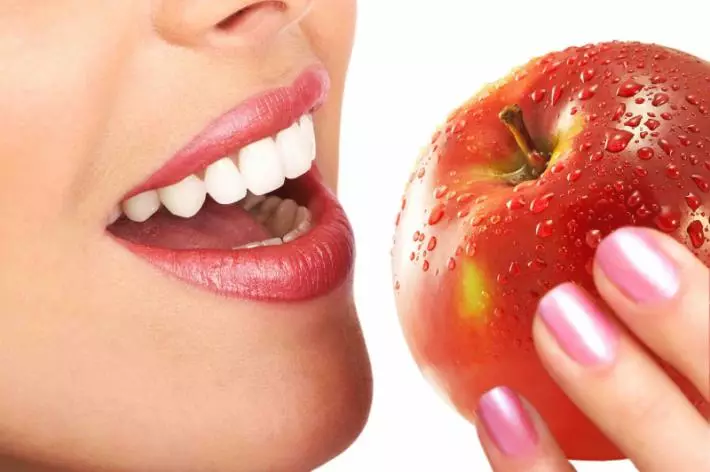
It is not a secret for anyone that almost all people are afraid of dental offices. Moreover, some people are so worried about it because they even prefer not to go to the dentist.
Considering such a huge amount of unnecessary stress and concern regarding dentists, and in general, about the health of the teeth, it is not surprising that many years have arisen a lot of myths associated with teeth problems. But false beliefs can be very harmful, so consider the 5 most common myths regarding the teeth in which very many people believe.1. Whitening Weakens Teeth
Everyone would like their teeth to be pearl and white, but sometimes regular cleaning of teeth and the use of dental threads simply do not help with it. Fortunately, there are many bleaching products - from gels to pastes and strips - which will help to "fool" a mother-nature and make the appearance of the teeth better.
Some people are worried that the use of bleaching means can damage the health of the teeth and weaken them. But for such experiences, there is really no reason. Products for bleaching are usually harmless if using them in accordance with the instructions. Teeth whitening affects only the color of the teeth, and not on their health or strength. This process works by removing the pigmentation of the teeth, and if they bleach them too much and remove too much natural pigmentation, the teeth may begin to look translucent. Some people can accept similar translucency for weakening enamel or damage to teeth, but it is not so - it is just a change in color.
2 Cleaning is harmful to bleeding gums
At first glance, this myth may make sense - if a person has a bleeding gum, it seems logical that you need to leave them alone until they heal. But in fact, the opposite is the opposite. When the gums are bleeding, this is a sign that the dental flare and food particles accumulate along the gum line, which are annoyed and inflamed. First you need to clean your teeth to remove dirt. Also, the gums can also be bleed, if you use dental thread for the first time or after some time, and the gums are not used to it.
The key is to use the thread regularly and neatly. Dentists recommend holding a toothbrush so that the bristles are at an angle of 45 degrees to the teeth, and the bristles were directed to the gums. This is the most efficient way to remove a dental plaque with a toothbrush. And when you use a dental thread, you do not need to stretch the dental thread between the teeth - instead it is worth carefully moving it back and forth on the teeth while it does not slip between the teeth. This may take some time, but ultimately bleeding and soreness will disappear. If this did not happen, it may be a sign of a more serious problem, and you should contact the dentist.
3 Bad breathing means a bad toothbrush
In fact, silent breathing can be caused by several factors, only one of which is poor oral hygiene. The products that man eats are the main culprit - for example, if in the stomach of full garlic and onions, it will definitely give the breath of an unpleasant smell, no matter how much brushing your teeth and use the thread. What about such diseases like pneumonia. At the same time, no one wants to kiss the patient, and it is not only fearful to get sick, some diseases can also cause a bad smell of mouth.
But what about the "natural" smells of mouth. If you follow the recommendations of the dentist on cleaning with a toothpaste and dental thread at least two times a day, as well as to visit the dentist at least two times a year for regular examinations, it is confident that silent breathing is not a problem of oral hygiene. But if it still appeared, it is worth asking for his dentist - he or she can determine whether it is a problem associated with the hygiene of the teeth, or caused by something else.
4 The more sugar eat, the worse it will be for the teeth
Many since childhood are accustomed to approval that Irisky or chocolate candies are very poorly affected by the health of the teeth and are fraught with caries. In fact, the amount of sugar that uses a person is not a decisive factor in the destruction of the teeth.
Bacteria in the mouth feeds carbohydrates, such as sugar, and produce an acid that corps the enamel of the teeth. The longer sugar is in the mouth, the longer bacteria can eat and produce acid, and the longer acid can affect enamel. In other words, we are not talking about the number of sugar that uses a person, but how long sugar is in contact with the teeth.
5 Aspirin, laid directly to the tooth, will facilitate pain
This is an old home recipe, and it is completely false - one should never put aspirin directly on the sick tooth or next to it. In the end, if, for example, the head will hurt, no one will put aspirin on the forehead.
The only safe and efficient way to take a tablet aspirin is to swallow it. When you swallow aspirin, it is absorbed into the body through the digestive tract. Then it enters the bloodstream and spreads throughout the body. Aspirin works, stopping the production of prostaglandins, molecules that send "messages" about pain from the damaged part of the body into your brain. When aspirin reaches a sick tooth, it inhibits the production of prostaglandin there, reducing sense pain. Moreover, if we put aspirin directly on the patient tooth or gum, it can lead to an acidic chemical burn gums and lips.
